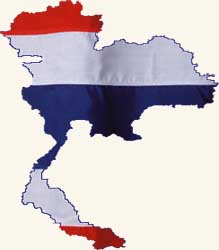Thailand's paddy politics threatens rice trade
 Bangkok - Four and a half decades ago, Myanmar, also known as Burma, was the world's leading rice exporter.
Bangkok - Four and a half decades ago, Myanmar, also known as Burma, was the world's leading rice exporter.
A military coup in 1962 followed by the introduction of socialism swiftly stifled free trade in Myanmar, allowing neighboring Thailand to take the top rice-exporter slot, which it has held ever since.
But populist polices in Thailand's rice fields are slowly undermining its leading role in the trade.
Thailand is arguably unique in Asia. The country produces more than 20 million tons of rice per year, of which 10 million tons are consumed domestically. The remainder is exported.
"We grow rice for business," said Chookiat Ophaswongse, president of the 90-year-old Thai Rice Exporters Association. "We're not like other countries that grow rice because they want to be self-sufficient in food and just export the surplus."
There are more than 200 members in the association, plus 50 to 60 other exporters who operate freely on the market.
Business has been good. Last year, during the so-called food crisis when India and Vietnam slapped bans on their own rice exports, Thailand shipped more than 10 million tons, earning the kingdom 200 billion baht (5.6 billion dollars).
Business was especially good for a handful of rice exporters who succeeded in bidding for public rice stocks under the government's paddy-pledging scheme, which has become a prime player on the Thai rice market over the past eight years.
Under the scheme, the government pays farmers a fixed price for their rice, which is stockpiled in millers' warehouses and then auctioned off to exporters.
Introduced in 1980, the scheme initially guaranteed farmers rice prices at market levels to allow them to postpone sales to middlemen. Since 2001, after populist politician Thaksin Shinawatra became prime minister, the scheme's goal was altered to stabilizing rice prices on the local market and boosting farmers' incomes.
Although admirable in principle, the application of the scheme has proven corruption-prone and advantageous mainly to big exporters and large, prosperous farmers. Furthermore, it has undermined Thailand's reputation for high-quality rice and skewered the market system.
For instance, this year, because of high prices offered under Thailand's paddy-pledging system, Thailand's 100-per-cent B grade white rice is being priced at 575 dollars per ton on the export market, compared with Vietnam's 410 dollars.
Thailand's rice exports during the first six months of 2009 reached 4.1 million tons, down 27 per cent compared with last year's shipments, while Vietnam's rice exports hit 3.8 million tons, up 56 per cent year-on-year.
Vietnam has kept its prices down partly because it faces tough competition from Pakistan, Cambodia and Myanmar, all of which sell lower-quality rice than Thailand.
That reputation for high-quality rice is being swiftly undermined by the government's paddy-pledging scheme, which is encouraging Thailand's neighbours to smuggle their rice into Thailand to benefit from the higher local price.
"Every year, at least 500,000 tons is coming across the border into Thailand," Chookiat said. "This is huge."
It is likely to get even bigger next year when rice is included in the Association of South-East Asian Nations Free Trade Agreement, which is to impose low import taxes on the regional rice trade.
"The quality of Thai rice has dropped, partly because of the smuggled rice from neighbouring countries and partly because our own farmers don't care about quality anymore because whatever they grow, they can sell to the government," Chookiat said.
Past Thai governments did not care because they benefited from kickbacks from a handful of big exporters with political connections and votes from happy farmers, said Nipon Poapongsukorn, president of the Thailand Development Research Institute think tank.
"The paddy-pledging programme gives the politicians both votes and money," Nipon said. "It's win-win."
The institute, which estimated the government spends up to 200 billion baht on the paddy-pledging and similar schemes for other crops, has proposed the government switch to an insurance plan that would cover the costs and a small profit margin for farmers but keeps the government out of the rice trade.
Prime Minister Abhisit Vejjajiva is reportedly considering the change, but it is unlikely his Democrat-led government would be around for long to implement it.
Thailand's options are few, according to Nipon. Either the government must find the will to change its price-support system or bow out to others in the rice race.
"If the dictators went away, Myanmar would become our major competitor within a few years," he said.
"Sooner or later, we are not going to be the world's number one rice exporter, but we should maintain our position as the world's number one exporter of quality rice," Nipon said. "That's the direction we should go in." (dpa)